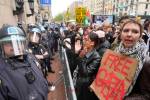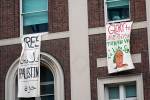Prosecutors won’t say why they oppose ACLU fight against blog subpoenas
Federal prosecutors want to halt an ACLU effort to keep the government from nosing into the identities of two people who posted vague threats online.
But prosecutors don't want to tell the ACLU, or anybody but one federal judge, why.
The U.S. Attorney's Office on Monday evening filed a motion to dismiss the effort by the American Civil Liberties Union of Nevada, which is fighting federal grand-jury subpoenas issued to the Review-Journal, whose Web site posted the alleged threats.
The comments referred to jurors and a government lawyer involved in a criminal tax trial now under way.
"Ex parte" means federal prosecutors will not share their legal reasoning with anyone but the judge, not even with the ACLU.
Normally, ex parte communication with a judge occurs because of an emergency, where there is not enough time to summon the opposing party.
Grand jury proceedings, too, occur in secrecy. But the subpoenas' existence has been widely publicized, even by media outlets beyond the Review-Journal.
"We can't comment on any investigation," U.S. Attorney Greg Brower said Wednesday,
The civil rights organization is trying to intervene on behalf of four anonymous clients, who say they posted anonymously on the newspaper site and now feel threatened by the subpoenas.
A May 26 article about the trial's start had collected 222 comments by Wednesday. They address not only the trial but also hot-button topics such as the U.S. monetary policy, the Federal Reserve System and the Internal Revenue Service.
On Monday evening as well, the ACLU amended its existing motion to make clear it wants to quash use of the identifying data that the newspaper already has turned over.
The amended motion also clarifies that the ACLU wants a court to rule on the constitutionality of both subpoenas served on the Review-Journal in relation to the reader postings.
One targeted commenter called the jurors "dummies" who "should be hung" if they convict Kahre, a local businessman who is one of four people on trial for tax crimes.
The other posting suggested a wager that one prosecutor would not reach his next birthday.
"When the fundamental issue is government abuse, it's really improper," McLetchie said. "Any concern about judicial process is only heightened if this matter is kept private between the judge and one of the parties to the matter."
Local attorney Stan Hunterton, a former federal prosecutor, said filing ex parte and under seal is common practice for grand jury matters. But he believes the historical reasons for grand jury secrecy, to protect witnesses and keep wrongdoers from fleeing, may not apply in this case.
The June 16 subpoena, seeking just two identities, was a narrowed replacement of a June 2 grand jury subpoena to the newspaper. That subpoena had sought data on readers who had aired their views below the article.
The newspaper complied with the second subpoena on June 19, by giving a grand jury the data it has on the writers of those two comments, which the newspaper has since deleted from its Web site.
The government will have to trace Internet service provider accounts to locate the writers.
Contact reporter Joan Whitely at jwhitely@reviewjournal.com or 702-383-0268.























